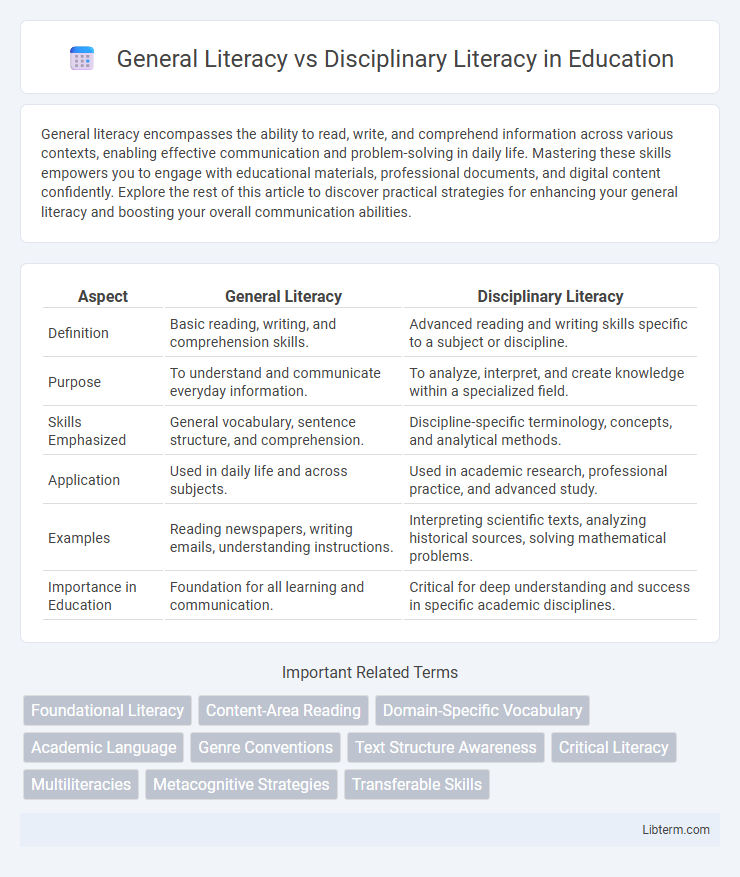General literacy encompasses the ability to read, write, and comprehend information across various contexts, enabling effective communication and problem-solving in daily life. Mastering these skills empowers you to engage with educational materials, professional documents, and digital content confidently. Explore the rest of this article to discover practical strategies for enhancing your general literacy and boosting your overall communication abilities.
Table of Comparison
| Aspect | General Literacy | Disciplinary Literacy |
|---|---|---|
| Definition | Basic reading, writing, and comprehension skills. | Advanced reading and writing skills specific to a subject or discipline. |
| Purpose | To understand and communicate everyday information. | To analyze, interpret, and create knowledge within a specialized field. |
| Skills Emphasized | General vocabulary, sentence structure, and comprehension. | Discipline-specific terminology, concepts, and analytical methods. |
| Application | Used in daily life and across subjects. | Used in academic research, professional practice, and advanced study. |
| Examples | Reading newspapers, writing emails, understanding instructions. | Interpreting scientific texts, analyzing historical sources, solving mathematical problems. |
| Importance in Education | Foundation for all learning and communication. | Critical for deep understanding and success in specific academic disciplines. |
Defining General Literacy
General literacy encompasses fundamental skills in reading, writing, and numeracy that enable individuals to comprehend and communicate effectively across everyday contexts. It serves as the foundational ability to interpret and produce basic texts, facilitating functioning in society and access to information. This competency contrasts with disciplinary literacy, which requires specialized reading and writing skills tailored to specific academic fields or professions.
Understanding Disciplinary Literacy
Understanding disciplinary literacy involves recognizing how specific fields require unique reading, writing, and thinking skills tailored to their content and methods. Unlike general literacy, which focuses on basic comprehension and communication abilities, disciplinary literacy emphasizes mastering the language, tools, and conventions distinct to disciplines like science, history, or mathematics. Developing these specialized skills enables deeper analysis, critical thinking, and effective problem-solving within each academic or professional field.
Key Differences Between General and Disciplinary Literacy
General literacy encompasses foundational skills such as reading, writing, and critical thinking across a broad range of everyday contexts, while disciplinary literacy involves specialized knowledge, vocabulary, and analytical methods unique to specific academic fields like science, history, or mathematics. The key differences include the depth of content understanding, with disciplinary literacy requiring mastery of domain-specific concepts and conventions that enable students to engage deeply with subject matter. General literacy provides the base for communication and comprehension, whereas disciplinary literacy supports expert-level interpretation and production of texts within distinct disciplines.
The Importance of General Literacy Skills
General literacy skills provide the foundational abilities in reading, writing, and critical thinking essential for understanding and engaging with diverse texts across everyday contexts. These skills enable individuals to navigate information effectively, fostering lifelong learning and adaptability in various life situations. Mastery of general literacy forms the base for acquiring specialized disciplinary literacy, supporting academic success and professional expertise.
The Role of Disciplinary Literacy in Education
Disciplinary literacy emphasizes the unique ways experts in specific fields read, write, and communicate, enhancing students' ability to engage deeply with content in subjects like science, history, and mathematics. It fosters critical thinking and analytical skills by teaching discipline-specific vocabulary, text structures, and methods of inquiry, which are essential for academic success and real-world problem solving. By integrating disciplinary literacy into education, teachers help students develop advanced comprehension and expression tailored to each subject area, promoting higher-order learning and knowledge application.
Strategies for Teaching General Literacy
Teaching general literacy involves fostering skills in reading, writing, speaking, and listening that apply broadly across various content areas. Effective strategies include explicit instruction in phonemic awareness, vocabulary development, comprehension techniques, and fluency practice to build foundational language skills. Incorporating diverse texts and interactive activities helps learners connect language skills to real-world contexts, promoting lifelong literacy growth.
Approaches to Developing Disciplinary Literacy
Developing disciplinary literacy involves specialized instructional strategies tailored to the unique language, texts, and thinking processes of specific academic fields such as science, history, or mathematics. Approaches emphasize content-area reading and writing practices, integrating domain-specific vocabulary and analytical skills to enhance comprehension and communication within that discipline. Effective disciplinary literacy development incorporates authentic texts, collaborative discussions, and tasks that mirror professional practices to foster deeper understanding and expertise.
Assessing General vs Disciplinary Literacy
Assessing general literacy involves evaluating foundational skills such as reading comprehension, writing, and critical thinking across a broad range of texts and contexts. In contrast, assessing disciplinary literacy requires measuring students' ability to interpret, analyze, and produce content-specific language and texts within a particular field, such as scientific reports, historical documents, or mathematical problem-solving. Effective assessment of disciplinary literacy often incorporates authentic tasks that reflect real-world practices, enabling deeper understanding and application of domain-specific knowledge.
Challenges in Integrating Both Literacies
Integrating general literacy and disciplinary literacy poses challenges such as aligning broad reading and writing skills with specialized content knowledge in fields like science, history, or mathematics. Educators often struggle to design curricula that balance foundational literacy practices with critical thinking and vocabulary specific to disciplines. Overcoming these challenges requires targeted professional development and collaborative instructional strategies to support students' comprehension across diverse subjects.
Future Trends in Literacy Education
Future trends in literacy education emphasize a shift from general literacy--basic reading and writing skills--to disciplinary literacy, which involves mastering reading, writing, and thinking practices specific to academic disciplines. Educational policies increasingly advocate integrating discipline-specific strategies that enhance critical analysis, argumentation, and content comprehension essential for college and career readiness. Emerging technologies and adaptive learning platforms support this trend by providing tailored literacy practices aligned with the cognitive demands of science, history, and other specialized fields.
General Literacy Infographic

 libterm.com
libterm.com